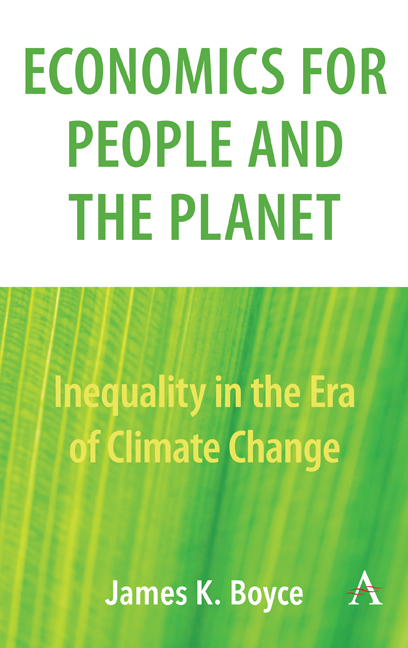Book contents
- Frontmatter
- Contents
- List of Illustrations
- Acknowledgements
- Part I Rethinking Economics and the Environment
- Part II Environmental Injustice
- Part III Climate Policy
- Chapter 17 Smart Climate Policy
- Chapter 18 Investment in Disadvantaged Communities
- Chapter 19 Dividends for All
- Chapter 20 Truth Spill
- Chapter 21 Four Pillars of Climate Justice
- Chapter 22 The Perverse Logic of Offsets
- Chapter 23 Climate Policy as Wealth Creation
- Chapter 24 The Carbon Dividend
- Chapter 25 Keeping the Government Whole
- Chapter 26 Air Quality Co-benefits in Climate Policy
- Chapter 27 Climate Adaptation: Protecting Money or People?
- Chapter 28 Forging a Sustainable Climate Policy
- Notes
- Publication History
- Index
Chapter 25 - Keeping the Government Whole
from Part III - Climate Policy
Published online by Cambridge University Press: 12 February 2019
- Frontmatter
- Contents
- List of Illustrations
- Acknowledgements
- Part I Rethinking Economics and the Environment
- Part II Environmental Injustice
- Part III Climate Policy
- Chapter 17 Smart Climate Policy
- Chapter 18 Investment in Disadvantaged Communities
- Chapter 19 Dividends for All
- Chapter 20 Truth Spill
- Chapter 21 Four Pillars of Climate Justice
- Chapter 22 The Perverse Logic of Offsets
- Chapter 23 Climate Policy as Wealth Creation
- Chapter 24 The Carbon Dividend
- Chapter 25 Keeping the Government Whole
- Chapter 26 Air Quality Co-benefits in Climate Policy
- Chapter 27 Climate Adaptation: Protecting Money or People?
- Chapter 28 Forging a Sustainable Climate Policy
- Notes
- Publication History
- Index
Summary
Carbon pricing will raise costs for governments, but policies can be designed to maintain their purchasing power along with the incentive to reduce their carbon footprints.
If and when the United States puts a cap or tax on carbon emissions as part of the effort to address global climate change, this will increase the prices of fossil fuels, significantly impacting not only household consumers but also local, state and federal governments. Households can be ‘made whole’, in the sense that whatever amount the public pays in higher fuel prices is recycled to the public, by means of a carbon dividend policy. Individual households will come out ahead or behind in monetary terms depending on whether they consume below-average or above-average amounts of carbon. Here we consider policy options for ‘keeping the government whole’, too, policies to ensure that additional revenues to government compensate adequately for the additional costs that result from the carbon price.
The price impacts of a carbon cap will be felt by federal, state and local governments. The prices of heating oil and coal-fired electricity will rise for schools and other public buildings, just as they will rise for homeowners. The prices of gasoline and diesel will rise for the Pentagon and other government agencies, just as they will for private citizens. To keep the government whole–to maintain real government spending and services at current levels–government revenues would need to grow correspondingly.
In this chapter we analyse two policy options for keeping the government whole:
• Distribute 100 per cent of revenue to individuals as taxable dividends: Here we assume that dividends are subject to federal and state income taxes at the same rate as ordinary income and also that dividends are spent by households and hence subject to state sales tax. We find that 24 per cent of dividends (on average) would be returned to the federal and state governments, an amount sufficient to keep the government whole in that it compensates for the impact of higher fossil fuel prices on government purchasing power.
• Revenue set aside for government, coupled with tax-free dividends to individuals: An alternative policy option is to earmark a fraction of the carbon revenue (that is, the revenue from carbon taxes or the sale of carbon permits) for governments, rather than recycling 100 per cent of it to the public.
- Type
- Chapter
- Information
- Economics for People and the PlanetInequality in the Era of Climate Change, pp. 117 - 124Publisher: Anthem PressPrint publication year: 2019



